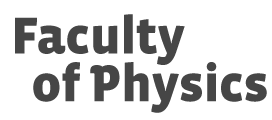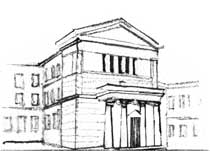Joint Seminar on Quantum Information and Technologies
2012/2013 | 2013/2014 | 2014/2015 | 2015/2016 | 2016/2017 | 2017/2018 | 2018/2019 | 2019/2020 | 2020/2021 | 2021/2022 | 2022/2023 | 2023/2024 | 2024/2025 | YouTube channel
until 2023/2024 Quantum Information Seminar | YouTube channel
2013-03-07 (Thursday)
Michał Zawada (UMK, Toruń)
Stabilność i dokładność optycznych zegarów atomowych na sieci optycznej
Stability and precision of optical lattice atomic clocks
2013-02-28 (Thursday)
Marcin Jarzyna (IFT UW)
Matrix product states for quantum metrology
2013-01-31 (Thursday)
Michal Sedlak (Institute of Physics, Slovak Academy of Sciences, Bratislava)
Memory cost of quantum protocols
In this contribution we consider the problem of minimizing theancillary systems required to realize an arbitrary strategy of aquantum protocol, with the assistance of classical memory. For thispurpose we introduce the notion of memory cost of a strategy, whichmeasures the resources required in terms of ancillary dimension. Weprovide a condition for the cost to be equal to a given value, and weuse this result to evaluate the cost in some special cases. As anexample we show that any covariant protocol for the cloning of aunitary transformation requires at most one ancillary qubit. We alsoprove that the memory cost has to be determined globally, and cannotbe calculated by optimizing the resources independently at each stepof the strategy.
2013-01-24 (Thursday)
Michał Oszmaniec (CFT PAN)
Koncentracja miary na orbitach działań grup w kontekście splątania
Measure concentration on group orbits in the context of entanglement
2013-01-17 (Thursday)
Adam Sawicki (CFT PAN)
Sferyczność działań grup, wypukłość odwzorowania momentu i rozmaitosci siecznych w zastosowaniu do badania lokalnej równoważności i klasyfikacji stanów
Clasification of local equivalence of quantum states via group actions and covexity of momentum map
2013-01-10 (Thursday)
Piotr Migdał (ICFO, Barcelona)
Qubism: self-similar visualization of many-body wavefunctions
I will present a visualization scheme, especially useful for 1D spin chains. Its main property is its recursivity: increasing the number of qubits reflects in an increase in the image resolution. Many features of the wavefunction, such as entaglement, magnetization and criticality, can be visualized as properties of the images. We use Renyi fractal dimension to investigate its self-simialar structure.
2012-12-20 (Thursday)
Jason Doukas (University of Nottingham)
Localized detection of the Unruh effect: Entanglement degradation across the horizon
The Unruh effect is a fundamental result of the application of quantum field theory to curved spacetimes. It states that accelerated observers experience the vacuum as a thermal state of particles at a temperature proportional to the acceleration. The subject of the Unruh effect has received renewed interest in the last decade, as the quantum optics community have begun to realize that the Unruh transformation is an example of a basic and well-known class of Gaussian unitary operations known as two-mode squeezing operations. Two mode squeezed states, are entangled states that are routinely generated by parametric-down conversion in non-linear crystals. It has been the focus of the newly emerging field of Relativistic Quantum Information theory to characterize how this Unruh squeezing operator in conjunction with the existence of event horizons can degrade the entanglement that accelerated observers see. However, when looking at entanglement seen between accelerated and inertial observers, previous studies had misinterpreted the dependence of initial state with that of the acceleration. This misinterpretation can be traced back to the use of global field modes like Unruh modes, where the inability to control the size and location of their observation left the physical interpretation of these models unclear. In this talk I will discuss a recent series of works I have done in collaboration, which re-investigates the problem of entanglement degradation due to acceleration in a localized setting. I will discuss how the approach enables one for the first time to solve the acceleration degradation problem and leads to new insights into the degradation process.
2012-12-13 (Thursday)
Karol Życzkowski (UJ)
O informacji kwantowej, nierównościach entropowych i ograniczeniu na informacje Holevo
On quantum information, entropic inequalties and the Holevo bound
2012-12-10 (Monday)
Frederic Grosshans (CNRS, Paris)
Increasing the Robustness of BB84 through Continuous Variable Cryptography Techniques
2012-11-29 (Thursday)
Piotr Gawron (Instytut Informatyki Teoretycznej i Stosowanej PAN)







